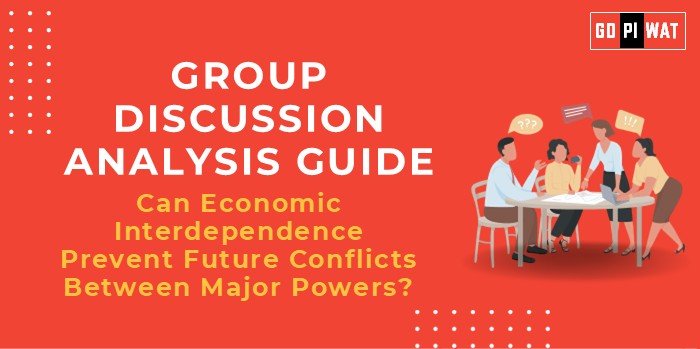📋 Group Discussion (GD) Analysis Guide
🌐 Can Economic Interdependence Prevent Future Conflicts Between Major Powers?
📖 Introduction to the Topic
Opening Context: Globalization has made the world more interconnected than ever, with economic interdependence playing a vital role in shaping international relations. However, whether economic ties can deter major powers from engaging in conflicts remains a contentious debate.
Topic Background: Economic interdependence refers to the mutual reliance between nations, primarily through trade, investments, and supply chains. Historically, this concept was highlighted during the Cold War to reduce tensions. Recent examples, such as trade relations between the US and China, demonstrate both its potential as a conflict-prevention tool and its vulnerabilities in escalating tensions.
📊 Quick Facts and Key Statistics
- 🌍 Global Trade Volume: $32 trillion in 2023 (UNCTAD) – Demonstrates economic interconnectedness.
- 🇨🇳 China-US Trade: $690 billion (2022) – Highlights critical interdependence despite strategic rivalry.
- ⚡ Russia-EU Energy Dependency: 40% of Europe’s gas supply came from Russia pre-2022.
- 💸 Global GDP Impact of Conflicts: $14.9 trillion lost due to conflicts in 2021 (Global Peace Index).
🌟 Stakeholders and Their Roles
- 🏦 Governments: Formulate trade agreements, impose sanctions, and engage in diplomacy.
- 🏢 Multinational Corporations (MNCs): Drive cross-border trade and investment flows.
- 🏛️ International Organizations: WTO, IMF, and UN promote trade norms and mediate conflicts.
- 👥 Citizens: Serve as labor forces and consumers, directly impacted by economic disruptions.
🏆 Achievements and Challenges
✨ Achievements
- 🇪🇺 EU Integration: Economic collaboration under the EU reduced the likelihood of intra-European wars.
- 🇺🇸 US-China Relations: Economic ties delayed escalation during trade wars.
- 🔗 Global Supply Chains: Interdependence fosters cooperation to avoid mutual losses.
⚠️ Challenges
- ⚖️ Overdependence Risks: EU’s reliance on Russian gas led to energy insecurity post-Ukraine invasion.
- 🔨 Weaponization of Trade: Sanctions often strain relations rather than prevent conflicts.
- 📉 Decoupling Trends: Geopolitical tensions may overshadow economic benefits, leading to “friend-shoring.”
📘 Global Comparisons:
– US-EU vs. US-China: Economic ties with the EU are more stable compared to the fluctuating US-China relations.
– East Asia: Japan and South Korea’s interdependence with China remains complex but largely peaceful.
💬 Structured Arguments for Discussion
- ✅ Supporting Stance: “Economic interdependence reduces the incentive for conflict by increasing mutual losses.”
- ❌ Opposing Stance: “Strategic priorities often override economic benefits, as seen in Russia-Ukraine tensions.”
- ⚖️ Balanced Perspective: “While economic ties can deter conflict, they are not a substitute for robust diplomacy.”
💡 Effective Discussion Approaches
- 🌏 Opening Approaches:
- Highlight historical examples like the EU’s formation to prevent wars.
- Use a case study, such as the US-China trade war, to illustrate complexities.
- Start with a statistic, e.g., “Global conflicts cost $14.9 trillion in 2021.”
- 🤔 Counter-Argument Handling:
- Challenge: “What about the economic sanctions against Russia?”
Response: “Sanctions highlight interdependence’s limits, but their mutual impact also shows the need for balanced reliance.” - Challenge: “Economic ties failed during World Wars.”
Response: “Modern interdependence is more entrenched with integrated supply chains and institutions.”
- Challenge: “What about the economic sanctions against Russia?”
🔍 Strategic Analysis of Strengths and Weaknesses
- 💪 Strengths: Promotes cooperation, reduces costs of conflict.
- ⚖️ Weaknesses: Vulnerable to strategic decoupling and coercion.
- 📈 Opportunities: Strengthen multilateral trade frameworks.
- ⚠️ Threats: Rising nationalism and trade weaponization.
🎓 Connecting with B-School Applications
- 🌍 Real-World Applications: Understanding the role of economic policies in shaping global peace can lead to research on trade negotiations or conflict resolution strategies.
- 💬 Sample Interview Questions:
- “How does economic interdependence impact national security policies?”
- “Can the WTO play a stronger role in conflict prevention?”
- 💡 Insights for Students:
- Study global value chains and their vulnerabilities.
- Explore the role of financial markets during geopolitical crises.


